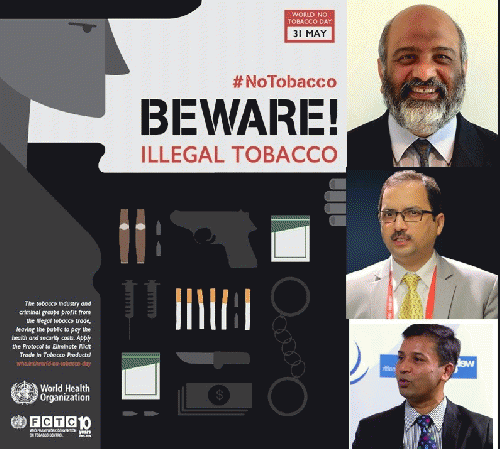Despite unprecedented pressure from tobacco industry to delay, dilute or thwart progress on a range of tobacco control measures globally, considerable achievements have been made by governments over the past years to protect public health. The global tobacco treaty, which was the first corporate-accountability and public health internationally binding treaty of the World Health Organization (WHO), is one major leap forward to move the world towards ending game of tobacco.
On this World No Tobacco Day 2015, it is important to acknowledge that despite advancements in tobacco control, formidable challenges remain. It is no surprise that tobacco-related diseases, disabilities and deaths are alarmingly on the rise despite progress in tobacco control. With over 6 million tobacco-related deaths globally (over a million deaths in India alone), there is no doubt that urgent public health priority is to accelerate progress towards ending game of tobacco, and preventing any further tobacco-related disease, disability or death globally.
"Daily average number of patients of cardiovascular diseases (CVDs) who come to Out-Patients-Department (OPD) is rising by 25-30% every year. More alarming is the fact that average age of significant number of patients has dropped down to less than 40 years. Most of these young patients usually have no conventional risk factor associated with CVDs such as diabetes or hypertension but tobacco use is often prevalent" said Professor (Dr) Rishi Sethi of Cardiology Department of King George's Medical University (KGMU).
New cases of all types of cancers rising - regardless of income!
Cancer is second only to CVDs as lead cause of death around the world. A new study "The Global Burden of Cancer 2013" Published in JAMA Oncology on 28 May 2015 confirms the worst fears: new cases of virtually all types of cancers are rising in countries globally - regardless of income! The study conducted by an international consortium of researchers led by the Institute for Health Metrics and Evaluation (IHME) at the University of Washington sends a strong message to governments globally: "Cancer remains a major threat to people's health around the world," said oncologist Dr Christina Fitzmaurice, lead author of this study. "Cancer prevention, screening, and treatment programs are costly, and it is very important for countries to know which cancers cause the highest disease burden in order to allocate scarce resources appropriately."
Prevention is better than cure - with tobacco established as a common big risk factor for cancers and CVDs among other life-threatening diseases, governments have no excuse to let corporations laugh their way to the bank at the cost of spreading illness, misery and deaths in communities.
People before profits: easier said than done!
Tobacco industry interference in public health policy is not new rather age-old tactic of industry to increase its markets and cast 'doubts' on evidences emerging against tobacco! Recognizing this, the global tobacco treaty (formally called WHO Framework Convention on Tobacco Control - FCTC) has a strong Article 5.3 one of the guiding principles states that there is a direct and irreconcilable conflict of interest between tobacco industry and public health. Due to this WHO FCTC Article 5.3, global tobacco treaty intergovernmental negotiations have been considerably firewalled from tobacco industry interference. But governments in countries are dealing with often alarming levels of industry interference when they attempt to do good on tobacco control. That is why, official conference declaration of 16th World Conference on Tobacco Health (WCTOH) held in March 2015 had a major recommendation: "All Parties (governments that have ratified the global tobacco treaty) establish and finance a multisectoral national coordinating mechanism of the WHO FCTC fully firewalled from the tobacco industry (Articles 5.2 and 5.3) and adopt comprehensive measures to prevent tobacco industry interference in public health policies in line with Article 5.3 guidelines."
(Note: You can view every article as one long page if you sign up as an Advocate Member, or higher).






